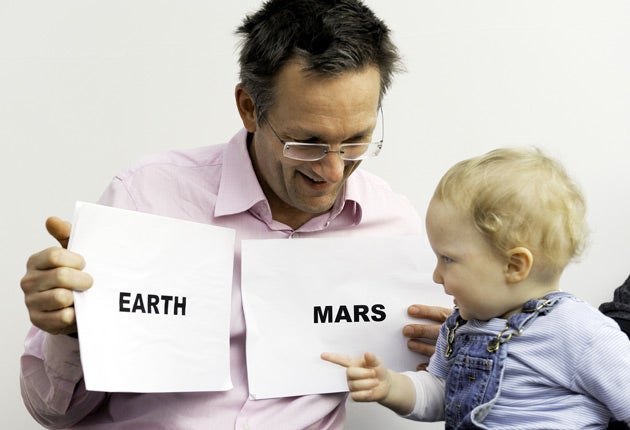Last Night's Television - Timing isn't everything
Horizon, BBC2; <br/>Make Me...Stay Awake, BBC1

The packaging-to-content ratio of most television programmes has changed significantly for the worse over the past decade, but now it's even happening on strands you might have hoped would be exempt from the supermarket-tabloid hard sell. Take Horizon, for example. "Still to come," promised the voice-over a little way into "The Secret Life of Your Body Clock". "Why dinner time could be deadly, and why your grandmother shouldn't wear sunglasses." That line – more redolent of an upmarket child's comic than a documentary intended for adults – tells you everything you need to know about Horizon's current approach to feeding its audience serious scientific content. Cut it into very small portions and arrange them into a smiley face on the plate.
That approach unfailingly sends my blood pressure soaring, so it was perhaps fortunate that I watched the preview copy of this programme in the early evening rather than between 6am and 9am in the morning, when, I'd just learnt, my blood vessels would be at their most inflexible and my blood at its stickiest. It's for this reason that most heart attacks occur in the morning, the kind of true-science, well-I-never curiosity with which this programme was packed, and that may well come in handy if you hit a conversational trough down at the pub. The best time to head there, incidentally, is notionally between 5pm and 7pm in the evening – when most people's body clocks will be on an upswing again – though popping out for an hour out at 9pm, while Horizon is on, might also appeal if you're the irascible type.
Occasionally, really intriguing bits of science can be glimpsed behind the wrapping (in this case, a jaunty animation of a day planner, complete with perky little marginal doodles). The programme touched on French research suggesting that chemotherapy drugs can be rendered far more effective, and far less debilitating, if they're timed to coincide with the patient's body clock. There was also an interesting section about a Dutch doctor who had discovered that the quality of life for Alzheimer's patients could be improved by exposing them to bright light during the daytime, giving them better sleep and improved mood. What there didn't seem to be time for, though, were any detailed explanations of the mechanisms that lie behind these findings, partly, one suspects, because it would be impossible to fit them into the scientifically flavoured lucky bag that Horizon has become.
Going against the body's internal timekeepers, one scientist suggested in Horizon, would be like "pushing a string uphill". A little over half an hour after Horizon had ended, Michael Mosley was trying to do precisely that in Make Me... Stay Awake, in which he measured how long he could defeat his inner craving for a bit of shuteye. Mosley presented himself as an ideal guinea pig for this trial, having dropped out of doctoring because he couldn't hack the night shifts and the midnight calls. You got the feeling that his search for a way of squeezing a few more hours out of the day wasn't just a pose but the fruit of a real irritation at his dormouse tendencies.
He went first to visit Tony Wright, a taciturn Gandalf type who has set the world record for self-imposed sleep deprivation (who knows what the torturers of Guantanamo have managed in this regard?). Wright pursued his record as part of a complicated (and mildly deranged) theory about the evolution of the human brain and the possibility of restoring ourselves to a condition of prelapsarian bliss, all of which you can find on the internet, and not a whiff of which made its way on screen, where Wright was simply employed as an expert in staying up for days at a stretch. Mosley lasted 42 increasingly miserable hours, ending up with slurred speech and balance problems. Then, this being something of a lucky bag, too, he went off to visit the site of a Texas sleep-deprivation contest that had ended prematurely after one of the competitors shot himself in the head, visited a laboratory where fruit flies had been genetically engineered to burn the candle at both ends (simultaneously halving their life expectancy and turning them into staggering wrecks) and tried out a cognitive-enhancing drug called Modafinil.
The drug worked like a treat, leaving him perky and sharp-minded, despite nearly two days without sustained sleep. Unfortunately, he was on Prince Edward Island in Canada and there was absolutely nothing he could do with the extra hours of consciousness that chemicals had gifted him. Even more unfortunately, the drug brought him out in weird welts, so, before his life turned into a David Cronenberg movie, he suspended the experiment and decided that he'd just have to put up with dozing off in front of his dinner guests. If there was an explanation of how Modafinil actually worked, I think I must have been in the middle of a microsleep when it went out.
Join our commenting forum
Join thought-provoking conversations, follow other Independent readers and see their replies
Comments
Bookmark popover
Removed from bookmarks